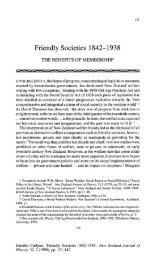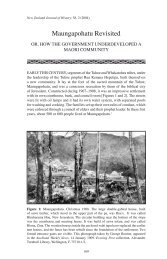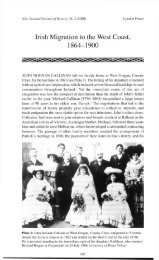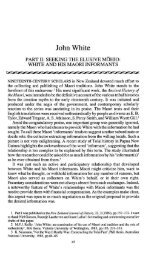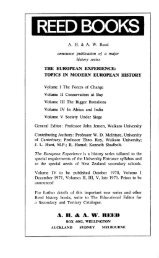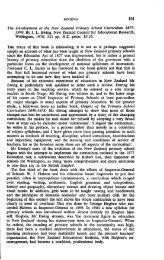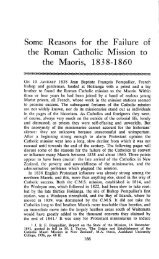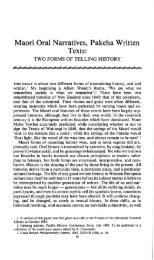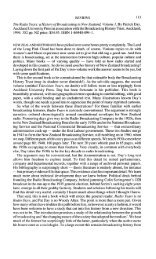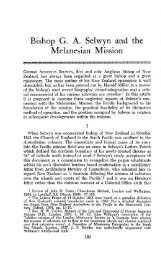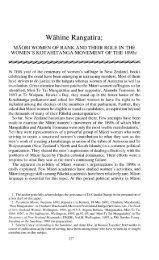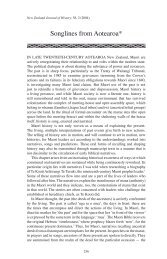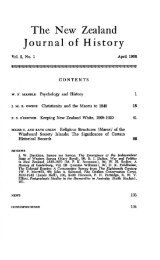New Zealand and the Mau in Samoa - New Zealand Journal of History
New Zealand and the Mau in Samoa - New Zealand Journal of History
New Zealand and the Mau in Samoa - New Zealand Journal of History
Create successful ePaper yourself
Turn your PDF publications into a flip-book with our unique Google optimized e-Paper software.
NEW ZEALAND AND THE MAU 103<br />
conventional constitutional terms, but would have reduced <strong>the</strong> direct<br />
<strong>in</strong>fluence <strong>of</strong> <strong>the</strong> faipule <strong>in</strong> matters <strong>of</strong> native policy. 34<br />
It is evident <strong>the</strong>refore that all matters relat<strong>in</strong>g to Native Affairs under <strong>the</strong><br />
first three <strong>New</strong> <strong>Zeal<strong>and</strong></strong> adm<strong>in</strong>istrators had <strong>the</strong> approval, not to say<br />
collaboration, <strong>of</strong> a body <strong>of</strong> <strong>Samoa</strong>n chiefs. Nor can it be said that <strong>the</strong>se chiefs<br />
were not representative because <strong>the</strong>y came from all over <strong>Samoa</strong> <strong>and</strong> most had<br />
been nom<strong>in</strong>ated ei<strong>the</strong>r by o<strong>the</strong>r members <strong>of</strong> <strong>the</strong> fono or (under Richardson) by<br />
chiefs <strong>of</strong> <strong>the</strong> district that <strong>the</strong>y represented. It would not have been possible to<br />
f<strong>in</strong>d a more representative group <strong>of</strong> <strong>in</strong>fluential <strong>Samoa</strong>ns for <strong>the</strong> purpose at <strong>the</strong><br />
time. Fur<strong>the</strong>r than that, <strong>in</strong> no o<strong>the</strong>r Pacific colonial territory, save Fiji, could<br />
it be said that more effort was taken to consult native op<strong>in</strong>ion <strong>and</strong> tra<strong>in</strong><br />
<strong>in</strong>digenous leaders <strong>in</strong> <strong>the</strong> pr<strong>in</strong>ciples <strong>and</strong> practices <strong>of</strong> modern government. It is<br />
untenable <strong>the</strong>refore to argue that <strong>the</strong> <strong>Mau</strong> was <strong>the</strong> result <strong>of</strong> bad policies or<br />
oppression unless it is also argued that <strong>Samoa</strong>'s lead<strong>in</strong>g chiefs shared<br />
responsibility for <strong>the</strong>m. What <strong>the</strong>se policies did not do, however, was satisfy<br />
<strong>the</strong> ambitions <strong>of</strong> <strong>Samoa</strong>n chiefs for real <strong>and</strong> immediate power (especially <strong>of</strong><br />
chiefs who were not members <strong>of</strong> <strong>the</strong> fono), nor could <strong>the</strong>y deal with dissent<br />
from <strong>the</strong> settler community. S<strong>in</strong>ce, under <strong>the</strong> Germans, <strong>the</strong> fono had had no<br />
power, <strong>and</strong> s<strong>in</strong>ce it was an <strong>in</strong>stitution which had no traditional precedent, it is<br />
unlikely that vacancies filled under <strong>the</strong> consultative processes <strong>of</strong> Logan, Tate<br />
<strong>and</strong> Richardson were occupied by chiefs <strong>of</strong> much importance. The most<br />
exalted chiefs would almost certa<strong>in</strong>ly have regarded <strong>the</strong> position as somewhat<br />
demean<strong>in</strong>g, or at least beneath <strong>the</strong>m, so when <strong>the</strong> status <strong>and</strong> <strong>in</strong>fluence <strong>of</strong> <strong>the</strong><br />
fono began to rise <strong>in</strong> <strong>the</strong> early 1920s, it is <strong>in</strong>evitable that <strong>the</strong>y should have<br />
been resentful <strong>and</strong> felt that <strong>the</strong> adm<strong>in</strong>istration was try<strong>in</strong>g to eclipse <strong>the</strong>ir<br />
traditional status.<br />
A basis can <strong>the</strong>refore be found <strong>in</strong> traditional political assumptions for<br />
senior <strong>Samoa</strong>n chiefs to mount a protest aga<strong>in</strong>st <strong>the</strong> government. Longresident<br />
settlers also had grievances, some <strong>of</strong> which were peculiar to <strong>the</strong><br />
present regime <strong>and</strong> o<strong>the</strong>rs extend<strong>in</strong>g back <strong>in</strong>to German times. It was<br />
unfortunate for <strong>the</strong> government that <strong>the</strong>se two groups, chiefs <strong>and</strong> settlers,<br />
should have been able to make common cause. For each - settlers <strong>and</strong><br />
frustrated chiefs - <strong>the</strong> path to success was by collaboration with <strong>the</strong> o<strong>the</strong>r <strong>in</strong><br />
<strong>the</strong> exploitation <strong>of</strong> real or fabrication <strong>of</strong> imag<strong>in</strong>ed grievances. Successive<br />
adm<strong>in</strong>istrators warned repeatedly <strong>of</strong> <strong>the</strong> dangers posed by <strong>the</strong> settler<br />
community to good <strong>and</strong> stable government, <strong>and</strong> repeatedly attributed <strong>Samoa</strong>n<br />
unrest to settler agitation. Solf, who had his own troubles with discontented<br />
settlers, believed that white <strong>in</strong>triguers were implicated <strong>in</strong> <strong>the</strong> protest<br />
movements <strong>of</strong> 1904-5 <strong>and</strong> 1908-9. 35 Logan's end-<strong>of</strong>-term report drew<br />
attention to <strong>the</strong> conflict <strong>of</strong> <strong>in</strong>terest between <strong>the</strong> <strong>in</strong>digenous <strong>and</strong> settler<br />
populations, <strong>and</strong> advised that if it were <strong>in</strong>tended to govern <strong>Samoa</strong> primarily<br />
34 Davidson, p. 108. It had been Tate's suggestion that <strong>Samoa</strong>n representation on <strong>the</strong><br />
Legislative Council should be by nom<strong>in</strong>ation <strong>of</strong> <strong>the</strong> Fono <strong>of</strong> Faipule, Report, 10 May 1922, IT1<br />
Ex88/3.<br />
35 Kees<strong>in</strong>g. pp.87. 92.



